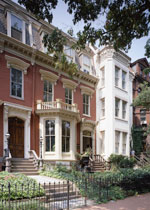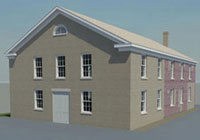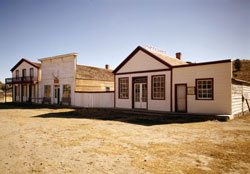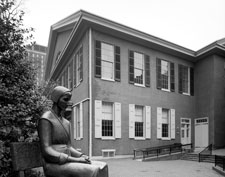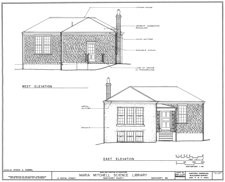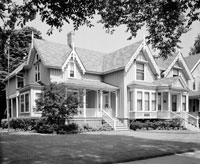Heritage Documentation Programs celebrates National Women's History Month
By Presidential Proclamation, Donald Trump designated March as National Women's History Month. In honor of Women's History Month, the Heritage Documentation Programs of the National Park Service explores women's history through architecture, engineering, and landscapes. Please join the Heritage Documentation Programs in celebrating the accomplishments of American women.
Featured Properties
Mary McLeod Bethune Council House National Historic Site
HABS DC-775
HABS DC-775-A
Washington, DC
Mary McLeod Bethune, in her multiple roles as educator, women's rights advocate, organizer,
and public policy activist worked endlessly in pursuit of what
she called, "the unalienable rights of citizenship for Black Americans."
Orchard House
HABS MA-552
Concord, Massachusetts
Family house of the Alcott family, their famous daughter, Louisa May Alcott, wrote her classic novel, Little Women, in this home in 1868. In 1966 it was listed on the National Register of Historic Places.
HABS NY-6304
Seneca Falls, New York
Known at times as the "Great Light House of Seneca Falls," Wesleyan Chapel housed the First Women's Rights Convention ever held in the United States. Here the Declaration of Sentiments was signed in 1848 by notable women activists, Elizabeth Cady Stanton and Susan B. Anthony.
South Pass City
HABS WY-27
HABS WY-29 through HABS WY-50
HABS WY-56
HABS WY-57
HABS WY-58
South Pass City, WY
50 years before the passage of the Nineteenth Amendment that guaranteed women the right to vote, Wyoming became the first state to allow women to vote. South Pass City, a small mining town, elected Esther Hobart Morris, the first woman in the United States to a public office, as Justice of the Peace in 1870. Race Street Meeting House
HABS PA-6687
Philadelphia, Pennsylvania
Used throughout the nineteenth century, this meetinghouse was home to women activists as well as abolitionists. Constructed by the Religious Society of Friends (Quakers) in 1856, they permitted women to participate in church affairs and in church government. The meetinghouse was designated a National Historic Landmark in 1993 for its role in the abolition of slavery, the advancement of women's suffrage, and the civil rights movement. Maria Mitchell House, Library and Observatory
HABS MA-901
HABS MA-1275
HABS MA-1276
Home of Maria Mitchell, the first female astronomer, the house is located in Nantucket, Massachusetts. In 1847 she discovered a comet and it became known as "Miss Mitchell's Comet." Constructed in typical Nantucket style, meaning it is characterized by a lack of symmetry, four bays, off-center doorway and chimney, and variance in window widths. Frances E. Willard House
HABS IL-1095
Evanston, Illinois
The home of Frances E. Willard, founder of the World's Women Christian Temperance Union, as well as the headquarters of the WCTU. Founded in 1883 the World's Women Christian Temperance Union became influential on reform policies as well helped transform the role of women within the public sphere. Rosie the Riveter/World War II Home Front National Historic Park, Kaiser Shipyards
HAER CA-326
HAER CA-326-A through HAER CA-326-O
Richmond, CA
During World War II, many African Americans flocked to the shipyards of Richmond, California, seeking economic and social opportunities not afforded to them in their former hometowns. The Henry J. Kaiser ship-building enterprise not only served the nation abroad by masterfully producing wartime vessels, but its producers laid a foundation at home which challenged unequal economic practices and the broader case of civil rights.





